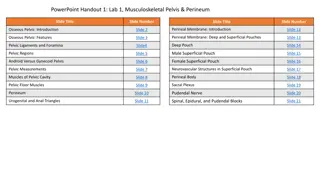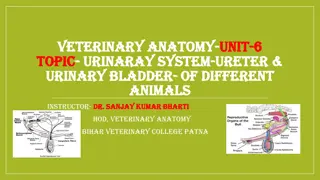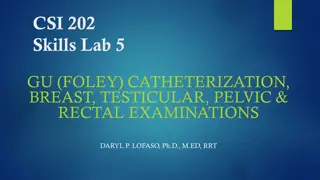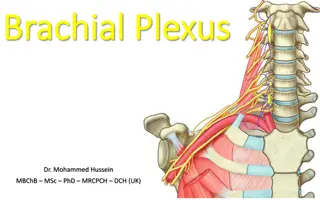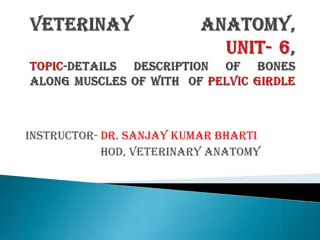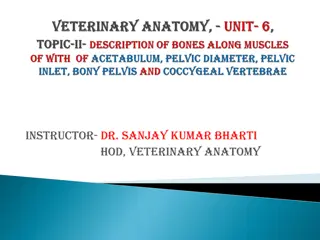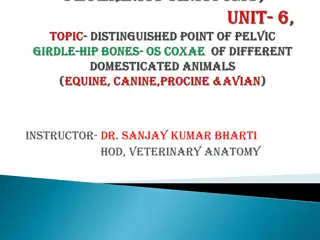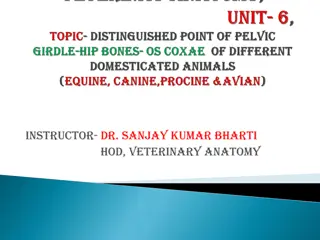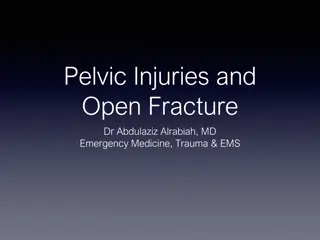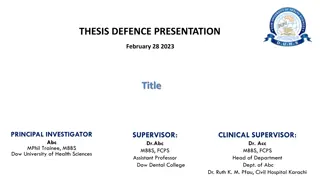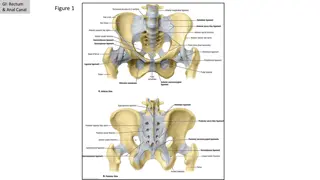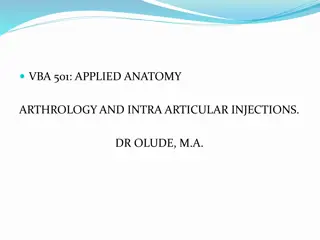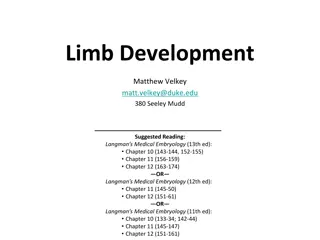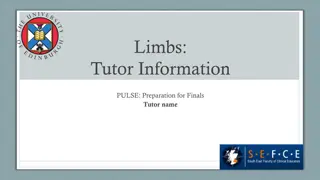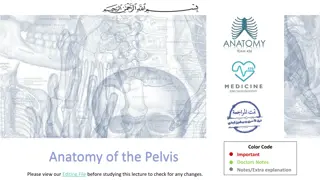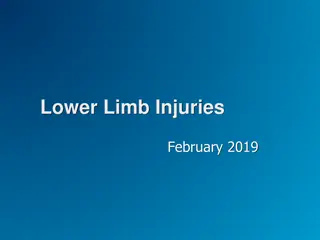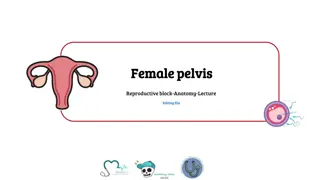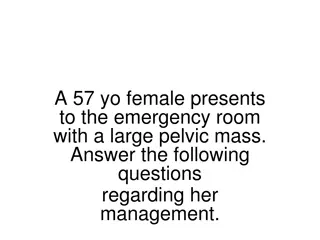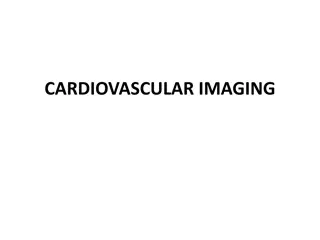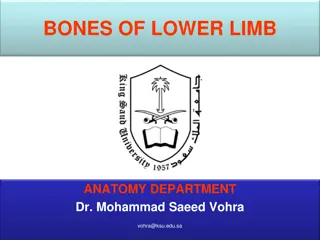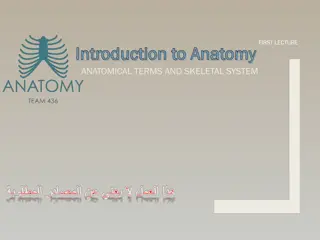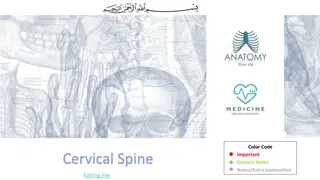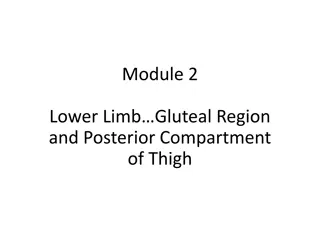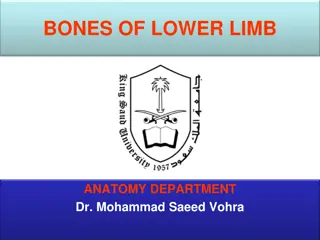Musculoskeletal Pelvis & Perineum Overview
Explore the anatomy of the pelvis and perineum, including the osseous pelvis structure, features, ligaments, and pelvic regions. Learn about the division of the abdominopelvic cavity and key neurovascular structures in this comprehensive PowerPoint presentation.
2 views • 21 slides
Veterinary Anatomy of Urinary System in Different Animals
The urinary system in animals includes kidneys, ureters, and the bladder, all crucial for filtration and urine excretion. The ureters are excretory ducts from the kidneys, while the bladder stores urine before expulsion. Various diagrammatic structures illustrate the urogenital system of animals, pa
0 views • 20 slides
Innovative Makeup Application Device for Bilateral Upper Limb Amputees
Proposed solution entails a makeup application device designed for bilateral upper limb amputees, enabling independent makeup application. The device incorporates three components: an intermediary device, makeup brush end-effectors, and a change-out station/makeup case. Addressing the need for empow
0 views • 22 slides
Adaptation of Animals to Hot Climates - Understanding Thermal Regulation Strategies
Animals have evolved remarkable adaptations to cope with hot climates, including physiological responses such as sweating and changes in body size and limb length. Temperature stress can affect their functioning, making thermoregulation crucial. Bergmann's rule and Allen's rule explain how body size
0 views • 15 slides
Economic Aspects of Applied Plant Anatomy in Practical Use
Applied Plant Anatomy involves the practical application of anatomical knowledge in various fields such as identification, classification, taxonomic applications, medicinal plants, food safety, wood analysis, forensic investigations, and more. By understanding plant anatomy, professionals can utiliz
0 views • 26 slides
Clinical Skills Lab: Foley Catheterization, Breast & Pelvic Examinations
This informative content covers topics such as urethral catheterization, indications for catheterization, anatomic landmarks, male and female catheterization techniques, nosocomial UTIs, pelvic and breast examinations, breast cancer screening recommendations, and breast cancer statistics. It is a co
1 views • 17 slides
Understanding the Brachial Plexus Anatomy and Function
The brachial plexus is a crucial network of nerves in the upper limb, formed by nerve fibers originating from C5 to T1 spinal levels. It plays a significant role in innervating the upper extremity muscles and providing sensory feedback. The plexus is categorized into roots, trunks, divisions, cords,
0 views • 55 slides
Understanding Pelvic Limb Anatomy: Bones and Muscles Overview
Bones and muscles of the pelvic limb, including the pelvis, thigh, leg, and foot, are detailed in this informative content. It covers the general designations of pelvic bones, descriptions of bones along with muscle attachments in various animals, and specifics about the hip bone structure and forma
1 views • 15 slides
Veterinary Anatomy Overview: Pelvic Cavity and Bony Pelvis Structures
The instructor, Dr. Sanjay Kumar Bharti, explains the acetabulum, obturator foramen, sexual differences, and characteristics of sheep and goats related to pelvic anatomy. Details include the structure of the acetabulum, the large obturator foramen, pelvic cavity, and differences between male and fem
2 views • 18 slides
Anatomy of the Upper Limb: Clavicle, Scapula, Humerus
The upper limb anatomy includes detailed descriptions of the clavicle, scapula, and humerus bones. The clavicle is a long bone that articulates with the sternum and scapula, while the scapula lies on the posterior chest wall and has important bony landmarks like the acromion and glenoid cavity. The
2 views • 15 slides
Veterinary Anatomy: Pelvic Structures and Sexual Dimorphism in Animals
The article discusses the anatomy of the acetabulum, obturator foramen, pelvic cavity, pelvic inlet and outlet, and sexual differences in the pelvis, with a focus on sheep and goats. It covers the structure of these pelvic components and highlights the variations between male and female anatomies. D
0 views • 19 slides
Understanding Pelvic Anatomy in Veterinary Science
In this educational content, we delve into the intricate details of acetabulum, obturator foramen, pelvic cavity, pelvic inlet and outlet, sexual differences, and anatomical variations in sheep and goats. The explanations are accompanied by informative images to aid in better comprehension.
0 views • 19 slides
Understanding Anatomy: Branches and Components of the Human Body
Anatomy, the study of body tissue structures, encompasses various branches including Gross Anatomy, Systematic Anatomy, and Microscopic Anatomy. Osteology focuses on the skeleton's components and functions as a crucial support system for the body, aiding in movement and protection of organs.
5 views • 12 slides
Understanding Upper Limb Deep Tendon Reflexes Examination
Exploring the intricacies of upper limb deep tendon reflexes (DTR) examination, this comprehensive guide elaborates on the monosynaptic stretch reflex mechanism, protective role of stretch reflexes, grading of reflexes, factors influencing reflex activity, and reinforcement techniques like the Jendr
0 views • 28 slides
Role of Lymphadenectomy in Genital Malignancies
Pelvic and paraaortic lymph node evaluation is crucial in the surgical staging of gynecological malignancies. The goals of lymph node dissection are to determine disease extent and guide further treatment. Pelvic lymph nodes include common iliac, external and internal iliac, obturator, sacral, and p
0 views • 16 slides
Insights on Pelvic Injuries, Open Fractures, and Young Classification in Trauma Care
Explore the expertise of Dr. Abdulaziz Alrabiah, MD in Emergency Medicine, Trauma & EMS through detailed images and descriptions of pelvic injuries, open fractures, and the Young Classification system. Enhance your knowledge on these critical aspects of trauma management.
0 views • 5 slides
Sexual and Reproductive Anatomy Lesson for 5th Grade
Explore the essential aspects of male and female sexual and reproductive anatomy in this detailed 5th-grade lesson from the Rights, Respect, Responsibility sexuality education curriculum. The images provided offer a visual guide to understanding external female anatomy and reproductive anatomy, aidi
0 views • 5 slides
Study on Work-Related Musculoskeletal Disorders and Median Nerve Entrapment in Upper Limb
Investigating the prevalence, factors, and treatment options for work-related musculoskeletal disorders, focusing on median nerve entrapment in the upper limb. The study aims to provide insights into this condition through a thorough literature review and research objectives.
1 views • 31 slides
Understanding Pelvic Ultrasonography: A Comprehensive Guide
Explore the detailed anatomy and variations of the uterus, ovaries, fallopian tubes, and adnexa in pelvic ultrasonography. Learn about the different shapes and sizes of the uterus, layers of the uterine wall, and indications for pelvic ultrasound examination. Discover the significance of the appeara
1 views • 18 slides
Strategies and Lessons Learned for Moving Anatomy Labs Online
Explore strategies, challenges, and tips for transitioning large lab-based anatomy classes online. Discuss considerations, effective delivery options, assessment methods, and examples like Human Anatomy activities. Learn from an Associate Professor's experience teaching human anatomy and physiology
0 views • 13 slides
Anatomy of GI Rectum and Anal Canal: A Detailed Visual Guide
This visual guide showcases detailed images of the gastrointestinal (GI) rectum and anal canal anatomy, including structures such as the perineum, pelvic diaphragm, external and internal anal sphincters, and various junctions within the rectum. Each image provides a clear depiction of the anatomical
0 views • 6 slides
Physiotherapy Support for Mothers with OASI - Expert Guidance and Rehabilitation
Providing specialized physiotherapy support for mothers experiencing Obstetric Anal Sphincter Injuries (OASI) is crucial for addressing immediate problems like pain, urinary or fecal incontinence, and more. With a focus on pelvic health, this approach involves reassurance, tailored pelvic floor musc
0 views • 12 slides
Overview of Joint Anatomy and Injections by Dr. Olude
Dr. Olude presents a comprehensive guide on applied anatomy, arthrology, and intra-articular injections. The content covers types of joints, classifications of synarthroses, diarthroses, and amphiarthroses, as well as thoracic limb articulations and important bones and joints of the forelimb. Detail
0 views • 28 slides
Development of Limbs: From Initiation to Bone Formation
Limb development begins in the fourth week of embryonic development, with limbs forming from paraxial and lateral plate mesoderm. The process involves mesenchyme condensation, chondrocyte differentiation, and endochondral bone formation. Limb defects can occur, affecting approximately 1 in 200 live
0 views • 28 slides
Neurological Assessment Essentials for Upper and Lower Limb Function
Learn about the motor and sensory nerve roots essential for evaluating upper and lower limb function, limb reflexes, and pathways of sensation. Understand key differences between UMN and LMN signs, common viva questions, and tips for preparing for finals.
0 views • 43 slides
Understanding Pelvic Anatomy: Bones, Joints, and Muscles
Explore the comprehensive overview of the anatomy of the pelvis, including its walls, bones, joints, muscles, and differentiations between male and female pelves. Learn about the boundaries, subdivisions, and pelvic floor components, as well as the arterial, nerve, lymph, and venous supplies. Delve
0 views • 27 slides
Understanding the Anatomy of the Ureter: A Comprehensive Overview
The ureter is an important structure responsible for transporting urine from the kidney to the bladder. This article delves into the measurements, course in the abdominal and pelvic regions, parts and relations of the ureter. Detailed descriptions and images provide a clear understanding of this vit
0 views • 16 slides
Lower Limb Trauma: Injuries and Management Overview
This collection of images and descriptions covers common lower limb injuries, such as neck of femur, femoral fractures, and knee injuries. It provides insights into the assessment, treatment, and potential complications associated with lower limb trauma, emphasizing the importance of prompt evaluati
0 views • 38 slides
Understanding Female Pelvis Anatomy and Differences from Male Pelvis
The female pelvis anatomy lecture covers the pelvic wall, bones, joints, and muscles. It explains the boundaries, subdivisions, and types of female pelvis, along with details on pelvic walls, floor, and diaphragm components. Additionally, it includes information on arterial, nerve, lymph, and venous
0 views • 13 slides
Disability Assessment and Certification Guidelines by Dr. Nitin Pandey
Disability assessment involves evaluating impairments and functional limitations to determine disabilities, especially in the context of locomotor disabilities. Dr. Nitin Pandey outlines the criteria for certification, highlighting factors like muscle strength, joint motion, coordination, stability,
0 views • 37 slides
Management of a 57-Year-Old Female with a Pelvic Mass: Assessments and Work-up
A 57-year-old female presents to the emergency room with a large pelvic mass. Detailed history and physical examination are crucial, focusing on risk factors, past medical history, family history, medications, habits, and social factors. Along with vital signs and lymphadenopathy evaluation, a thoro
0 views • 23 slides
Comprehensive Guide to Cardiovascular Imaging and Anatomy
Explore a detailed collection of images showcasing cardiovascular imaging, radiological anatomy of the chest, vascular anatomy, and pulmonary conditions like embolism. Discover the gold standard for diagnosing pulmonary embolism, as well as CT angiograms and aortic arch anatomy. Engage with visuals
0 views • 59 slides
Anatomy of Lower Limb Bones: Thigh (Femur and Patella) Overview
Explore the detailed anatomy of the bones in the lower limb, specifically focusing on the thigh bones - the femur and patella. Learn about the structure, function, and key features of these bones, including their articulations, surfaces, and attachments. Enhance your understanding of the classificat
0 views • 22 slides
Introduction to Anatomy: Anatomical Terms and Skeletal System
An introduction to anatomy covering anatomical terms and the skeletal system. It defines anatomy, explains anatomical sciences, discusses the skeletal system, and outlines anatomical terminology including terms of position. The content includes objectives, classifications of bones, and different ana
0 views • 28 slides
Understanding Pelvic Floor Dysfunction and Prolapse in Women
Pelvic floor dysfunction and prolapse are common issues affecting women, impacting their physical and emotional well-being. Surgical treatment may be necessary for symptomatic cases, but a thorough evaluation of symptoms, obstetric history, and other factors is crucial. Addressing precipitating fact
0 views • 72 slides
Anatomy Written Tests Overview with Sample Questions
Explore different types of anatomy questions commonly seen in written tests, including general anatomy, structural anatomy, functional anatomy, topographical anatomy, imaging anatomy, clinical anatomy, microscopic anatomy, and embryo-related topics. Sample questions and answers are provided for each
0 views • 12 slides
Best Practices in Critical Limb Ischaemia Care Pathways
This collection of survey results and methodologies highlights the need for consistent and evidence-based care pathways for critical limb ischaemia. Dr. Victoria Burrows and the BSIR R&A Committee provide valuable insights to address pathway delays and improve patient outcomes.
0 views • 24 slides
Understanding the Cervical Spine: Anatomy and Function Explained
Explore the anatomy of the cervical spine, focusing on the 7 vertebrae, their unique characteristics, joint structures, and movements. Learn about typical and atypical vertebrae, key features like foramen transversarium, and the importance of vertebral arch components. Dive into how the cervical reg
0 views • 17 slides
Comprehensive Study of Lower Limb Anatomy and Function
Explore the detailed anatomy of the gluteal region, posterior compartment of the thigh, blood vessels, nerves, and muscles of the lower limb. Learn about dermatomes, communication areas, muscle actions, Trendelenburg gait, and more. This educational resource is part of a pedorthic program of study f
0 views • 14 slides
Lower Limb Bones Anatomy Overview
Explore the bones of the lower limb, including the femur and patella of the thigh. Learn about the structure and features of these bones such as the head, neck, trochanters, and shaft of the femur. Enhance your knowledge on the classification of bones in the thigh, leg, and foot regions, distinguish
0 views • 22 slides
